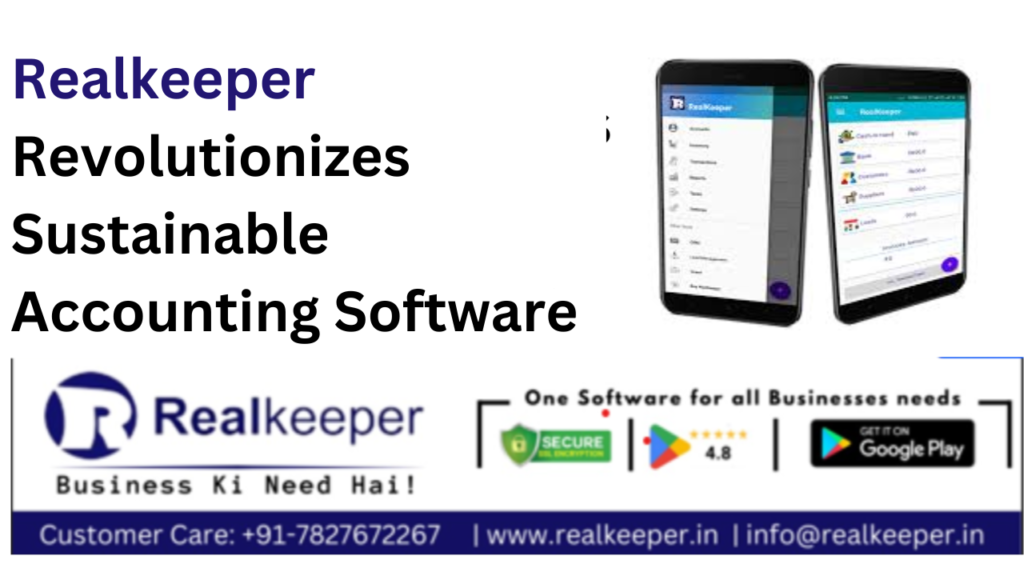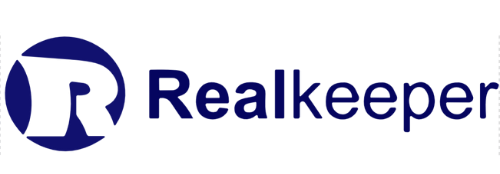In the modern business landscape, sustainability is no longer a mere buzzword; it’s a core strategy that shapes how businesses operate and thrive. Today, companies are not only held accountable for their financial performance but also for their environmental and social impacts. This paradigm shift has led to the development of tools and technologies that prioritize sustainability while improving business efficiency. Among these innovations is the rise of sustainable accounting software—a new wave of financial management solutions that integrates eco-conscious features with traditional accounting. One standout player in this domain is Realkeeper.
In this blog, we’ll dive deep into the concept of sustainable accounting software, explore the features that make Realkeeper an industry leader, and discuss how this software can help businesses meet both their financial and sustainability goals.

What is Sustainable Accounting Software?
Before understanding how Realkeeper fits into the equation, it’s essential to grasp the concept of sustainable accounting software. At its core, sustainable accounting software goes beyond traditional bookkeeping. It incorporates tools and features that help businesses measure, manage, and minimize their environmental and social footprints. Here are a few key elements that define sustainable accounting:
- Eco-Friendly Financial Management: Sustainable accounting software helps businesses track not only their financial health but also the environmental costs of their operations. For example, it might enable companies to measure their energy consumption, waste production, and carbon emissions, thus allowing them to make informed decisions that align with eco-conscious practices.
- Paperless Operations: One of the most significant contributors to business waste is paper usage. Sustainable accounting software helps businesses transition to digital, paperless environments. This reduces the need for physical storage, printing, and excessive resource consumption while improving efficiency and data security.
- Transparent Reporting: The software often provides transparency in reporting by integrating sustainability metrics into financial reports. Businesses can generate reports that showcase their financial performance alongside their environmental impact, making it easier to communicate their green efforts to stakeholders and customers.
- Compliance with Green Regulations: As global environmental regulations become stricter, businesses need to stay compliant. Sustainable accounting software often includes features that help companies adhere to local and international environmental standards, reducing the risk of fines and enhancing their reputation.
Realkeeper: A Pioneer in Sustainable Accounting
Now that we understand what sustainable accounting software is, let’s turn our attention to Realkeeper. Designed for small and medium-sized businesses, Realkeeper offers a full suite of accounting features while focusing on sustainability and resource efficiency. Here are the key features of Realkeeper that make it stand out as a sustainable accounting software solution.
1. Cloud-Based Efficiency for a Greener Future
One of the fundamental elements of sustainable accounting software is its ability to reduce waste and energy consumption. Realkeeper is a cloud-based platform, meaning that all financial data, reports, and transactions are stored securely online rather than in physical file cabinets. This significantly reduces the need for paper, ink, and physical storage spaces, contributing to a more eco-friendly workplace.
Cloud-based software also leads to reduced energy consumption compared to traditional on-premise accounting systems, which often require significant server power and cooling infrastructure. With Realkeeper, businesses can lower their carbon footprint while enjoying the flexibility of accessing their financial data from anywhere, anytime.
2. Digital Invoicing and Receipts: Reducing Paper Use
Traditional accounting often involves printing invoices, receipts, and statements, leading to massive paper consumption. However, Realkeeper enables businesses to fully embrace digital invoicing. Companies can send invoices, receipts, and financial statements to clients and suppliers electronically, cutting down on paper waste.
Moreover, this digital transformation improves efficiency. Realkeeper’s intuitive interface allows users to generate professional-looking invoices quickly and track payments, reducing the time and resources spent on administrative tasks. Digital invoices also help businesses maintain better records, as everything is stored and tracked online, reducing the chances of errors or misplaced documents.
3. Optimizing Resource Management with Inventory Tracking
Efficient resource management is another critical aspect of sustainable business operations. Realkeeper integrates inventory management features that allow businesses to track their stock levels, monitor resource usage, and identify inefficiencies that may lead to waste. By ensuring optimal resource allocation, businesses can reduce excess inventory, avoid overproduction, and lower their environmental impact.
With Realkeeper’s smart inventory tracking, businesses can make data-driven decisions to minimize waste while maximizing profitability. For example, tracking which products or materials are slow-moving or overstocked can help businesses adjust their purchasing decisions, reducing the amount of wasted goods that might otherwise end up in landfills.
4. Transparent Financial and Environmental Reporting
One of the significant challenges businesses face today is how to showcase their sustainability efforts to stakeholders, investors, and customers. Realkeeper’s powerful reporting tools address this challenge by integrating sustainability metrics into its accounting platform. Businesses can easily generate reports that highlight their financial performance alongside their environmental impact.
This level of transparency not only helps businesses communicate their green initiatives but also strengthens their reputation among eco-conscious consumers. Additionally, Realkeeper’s reporting features ensure businesses stay compliant with environmental regulations and demonstrate their commitment to corporate social responsibility (CSR).
5. Automation for Cost-Effective and Sustainable Growth
Realkeeper is designed to automate many of the manual processes associated with accounting. By automating tasks like data entry, invoicing, payroll, and tax calculations, businesses can reduce human error, improve efficiency, and cut down on the time spent on administrative work. This automation leads to both financial savings and more sustainable practices.
For example, by automating invoicing, businesses can save on printing, postage, and labor costs while minimizing the environmental impact associated with paper use and transportation. Automation also allows businesses to scale efficiently, supporting long-term sustainable growth without the need for excessive resource consumption.
6. Supporting Compliance with Environmental Standards
As global environmental regulations evolve, businesses are under increasing pressure to comply with sustainability standards. Realkeeper is equipped to help businesses navigate this complex regulatory landscape. The software’s robust compliance features ensure businesses stay up-to-date with the latest environmental laws and reporting requirements.
For companies looking to become certified as environmentally friendly or to apply for sustainability certifications, Realkeeper provides the tools to track the necessary data and generate the reports needed for certification. This compliance not only avoids potential fines but also enhances a company’s reputation as a responsible and forward-thinking enterprise.
Why Sustainable Accounting is the Future of Business
As environmental concerns continue to mount, businesses are being held accountable for their impact on the planet. Consumers are increasingly seeking out companies that prioritize sustainability, and governments are imposing stricter regulations on corporate environmental practices. Sustainable accounting software like Realkeeper not only helps businesses comply with these new demands but also gives them a competitive edge in the marketplace.
Moreover, sustainability is linked to long-term profitability. By reducing waste, optimizing resource use, and adopting eco-friendly practices, businesses can cut costs, enhance efficiency, and future-proof their operations. Realkeeper makes it easy to integrate these practices into everyday accounting, enabling businesses to grow sustainably without compromising on financial performance.
Conclusion: Realkeeper—The Go-To Solution for Sustainable Accounting
In an era where sustainability is becoming a business imperative, Realkeeper stands out as a powerful solution that helps companies align their financial goals with their environmental responsibilities. From cloud-based efficiency to digital invoicing, inventory management, and transparent reporting, Realkeeper offers a comprehensive suite of tools designed to help businesses reduce waste, optimize resources, and promote long-term sustainable growth.
By adopting Realkeeper, businesses can take a significant step toward a greener future while ensuring financial stability. Sustainable accounting is not just good for the planet—it’s good for business. So, if you’re looking to enhance your accounting processes while contributing to a more sustainable world, Realkeeper is the ideal choice for your company.
Partner Website Openstartup



